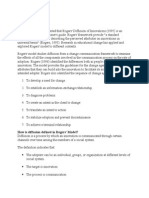
The process by which charismatic authority transitions from purely revolutionary leadership to something more traditional or legal is called the routinization of charisma. Answered 7 months ago Author has 31K answers and 11M answer views.

The term routinization of charisma relates to the work of Max Weber a German philosopher who is considered one of the founding fathers of sociology.
What does routinization of charisma mean. The routinization of charisma refers to the process whereby an organization is fractured following the demise or departure of a charismatic leader. While applied mostly to organizations such as corporations this term is also applied to nation-states that have lost a leader such as France under Napoleon or to religions such as Christianity. The term routinization of charisma relates to the work of Max Weber a German philosopher who is considered one of the founding fathers of sociology.
I found the following in the Encyclopedia of Religion and Society William Swatos jr - editor description of routinization. In Max Webers sociology particularly the process whereby charisma is stabilized into ongoing authority structures. The routinization of charisma although referring to a critical phenomenon is largely undefined in the sociological literature.
In particular the mechanisms whereby routinization proceeds remain problematic. The process of routinization of charisma by which the sect becomes a church is a transformation from the situation in which the religious motif largely determines the inner social structure of the sect and religious pressures predominate over social to one in which as the spirit recedes into remoteness and the sect hardens as it were into ecclesiastical forms the pressures predominate in the other direction from the social to the religious. Charismatic authority is that authority based on devotion to the charismatic individual who is treated by his followers as being endowed with exceptional superhuman or supernatural powers and qualities.
Legitimacy is derived from spiritual endowment rather than tradition or legally established rules and procedures. What Weber means is that over time either a bureaucracy vested with rational legal authority will supersede the charismatic leader or institutionalized structures will incorporate the charismatic impetus. This rationalization or institutionalization process is what Weber refers to as the routinization of charisma.
The process by which charismatic authority transitions from purely revolutionary leadership to something more traditional or legal is called the routinization of charisma. Death of a Guru. An Analysis of the Postcharismatic Phase in the Transcendental Meditation Movement.
The routinization of charisma is most directly and most deeply connected with his basic philosopic convictions. Charismatic authority unlike traditional authority is a revolutionary and unstable form of authority. Weber borrows the religious term of charisma and extends its use to a secular meaning.
Audiences and followers believe that charismatic leaders have a close connection to a divine power have exceptional skills or are exemplary in some way. Routinize definition to develop into a regular procedure. Turner in International Encyclopedia of the Social Behavioral Sciences 2001.
Charisma or gift of grace has been borrowed from theological discourse by the social sciences to describe forms of authority and leadership that depend on. WEBERbased on written rules bureaucratic authority Charismatic authority. WEBERpeople believe leader has been touched by godhas exceptional qualities Jesus LEAST STABLE AUTHORITY.
Transition from charismatic leader to traditional or rational-legal. Answered 7 months ago Author has 31K answers and 11M answer views. Charisma is basically the qualityattribute which enables a human being to make the unseen active and creative part of their consciousness visible in front of others.
Routinization of charisma See CHARISMA. Source for information on routinization of charisma. A Dictionary of Sociology dictionary.